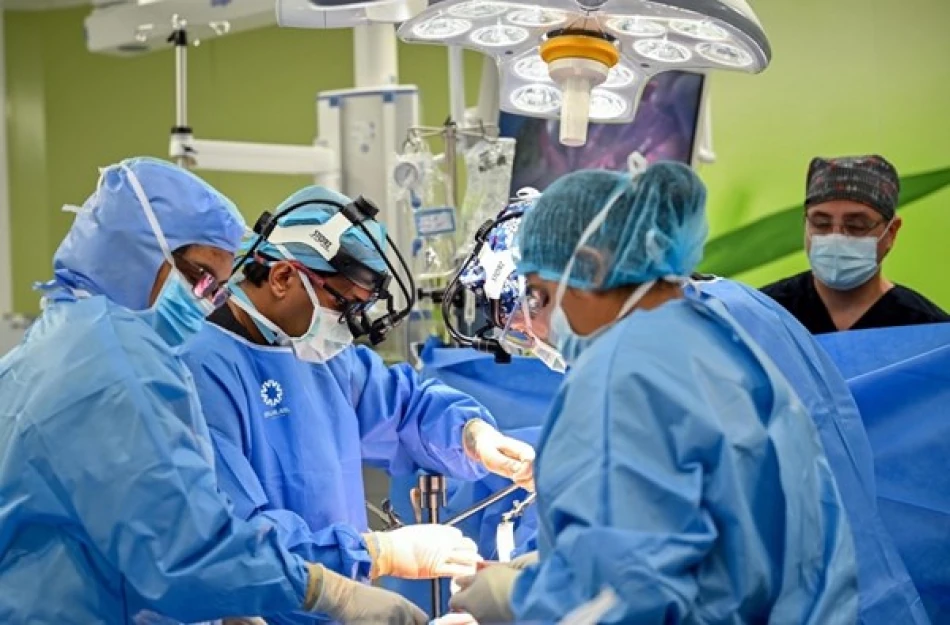
Burjeel Holdings Profits Soar 10.6% in H1, Reaching AED 187 Million
Burjeel Holdings Surges 129% in Q2 as UAE Healthcare Giant Expands Cancer Treatment Empire
UAE-based Burjeel Holdings has delivered explosive quarterly growth, with Q2 2025 profits jumping 129% to AED 148 million ($40.3 million), signaling the healthcare sector's robust recovery and the company's successful pivot toward specialized medical services. The Dubai-listed firm's aggressive expansion into oncology, mental health, and AI-driven diagnostics positions it as a regional healthcare consolidator at a time when Gulf states are diversifying their economies beyond oil.
Financial Performance Reflects Strategic Transformation
Burjeel's half-year profits reached AED 187 million, up 10.6% year-on-year, while revenues climbed 19% driven by a 12% increase in patient volumes across its facilities. The company's EBITDA surged 59%, pushing profit margins to 22% – a significant improvement that demonstrates operational efficiency gains.
This performance mirrors broader trends in the Gulf's healthcare privatization drive. Unlike traditional government-heavy healthcare systems, the UAE is betting on private operators like Burjeel to deliver specialized care while reducing public spending burdens.
Oncology Expansion: Building a Regional Cancer Treatment Hub
Burjeel's most strategic move involves creating a comprehensive oncology network across the Gulf. The company acquired Dubai's Advance Care diagnostic and treatment center while opening new Burjeel Cancer Institute clinics in Al Ain, Sharjah, and Oman.
More significantly, Burjeel launched the UAE's first specialized cancer pharmacy – a move that creates vertical integration similar to US healthcare giants like CVS Health. This infrastructure play ensures medication supply chain control while generating recurring revenue streams from high-value cancer treatments.
Why Cancer Care Matters for Gulf Healthcare
Cancer incidence in the Gulf region is rising due to lifestyle changes and an aging population. By positioning itself as the regional oncology leader, Burjeel is capturing a growing market while differentiating from competitors focused on general healthcare services.
Mental Health Platform Addresses Regional Gap
The launch of "Al Kalma," a joint venture mental health platform with four centers across the UAE and Saudi Arabia, represents Burjeel's recognition of an underserved market. Mental health services remain stigmatized in many Gulf societies, creating opportunities for private providers to fill gaps that government systems avoid.
This mirrors Singapore's approach to healthcare diversification, where private operators target specialized services while public systems handle basic care.
Technology Integration Sets Competitive Edge
Burjeel's investments in AI-powered diagnostics and its partnership with Abu Dhabi Ports Group for the "Doctor" logistics platform demonstrate technological sophistication beyond traditional healthcare providers. The zero-gravity diabetes research initiative, while seemingly futuristic, positions the company for space medicine opportunities as the UAE develops its space sector.
Asset Ownership Strategy Reduces Long-term Costs
The AED 170 million acquisition of the Medcare Hospital building in Dubai converts long-term lease liabilities into direct ownership, improving balance sheet flexibility. This real estate strategy provides inflation hedging while reducing operational costs – crucial as the Gulf faces potential economic headwinds.
Market Implications and Investment Outlook
Burjeel's expansion strategy comes as Gulf healthcare markets consolidate around a few dominant players. The company's focus on high-margin specialized services, rather than basic care, suggests sustainable competitive advantages that justify premium valuations.
For investors, Burjeel represents exposure to Gulf demographic trends – aging populations, rising chronic disease rates, and increasing healthcare spending as oil economies diversify. The company's 22% profit margins compare favorably to international healthcare operators, while its regional expansion provides growth optionality.
However, regulatory risks remain as Gulf governments balance private healthcare growth with public access concerns. Burjeel's success in maintaining government contracts while expanding private services will determine whether its current growth trajectory proves sustainable.
The 129% quarterly profit surge reflects more than cyclical recovery – it demonstrates how strategic healthcare consolidators can capitalize on structural demographic and economic shifts across the Gulf region.
Most Viewed News

 Layla Al Mansoori
Layla Al Mansoori






